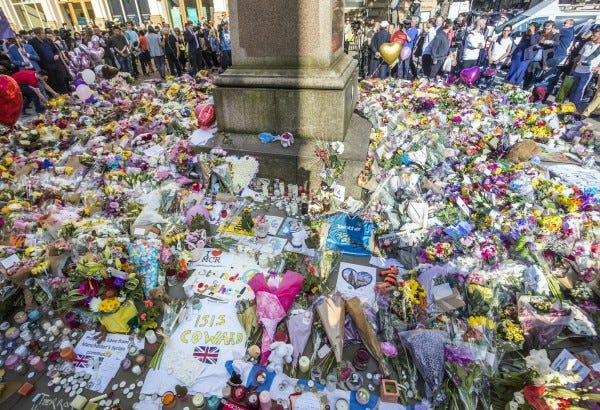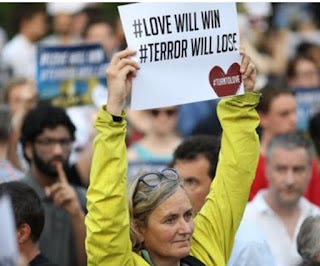"Fighting" Terror??

As I write this the nation is reeling from a series of traumatic events over recent weeks. People were still recovering from the shock of the Manchester bombing, when there was the attack on London Bridge, then in this last week the fire in Grenfell Tower and today a van being driven into a crowd of Muslims in Finsbury Park.
Three of these events were deliberate actions aimed at hurting, maiming and killing innocent people. A consequence of all the above is that people might be more fearful for their safety. The news media and social media do not help in their rush to pin the blame on someone (or some group), with the more extreme publications/posts raising suspicions against anyone that might be different to ourselves. That suspicion creates more fear and division within society, which leads to more persecution and ultimately more people with extreme fearful, angry views who may decide to take more direct action themselves. As one BBC reporter put it, ‘extremism breeds extremism’.
How do we begin to change this cycle? The government has said that it ‘will act to stamp out extremist and hateful ideology – both across society and on the internet, so it is denied a safe space to grow.’ However, I am not sure how practical this will be; in my experience you cannot force change in this way.
Just under 2000 years ago St Paul wrote to a church in Colossae that, like many other churches at that time (and since) was struggling with tensions and division. The rapid spread of Christianity had brought people into the same Christian community from very different backgrounds. There were soldiers and civilians, slaves and free, Jews and Gentiles (non-Jews), men and women, artisans and aristocrats, etc. People from many different backgrounds who would not normally mix were having to work out how to get along together as one community. At one point in his letter Paul writes:
… clothe yourselves with compassion, kindness, humility, gentleness, and patience. Bear with one another and, if anyone has a complaint against another, forgive each other; just as the Lord has forgiven you, so you also must forgive. Above all, clothe yourselves with love, which binds everything together in perfect harmony.
Colossians 3:12b-14

The Greek word translated ‘love’ in the above passage is ‘agapé’. This is a sacrificial, giving love that is kind, compassionate and forgiving. A love that seeks to understand and to work for peace and justice. It is this love that we have seen revealed in the way that many in our society (from all races, religions, creeds, backgrounds, etc) have acted in the last week. It is this love that moved people (from all races, religions, creeds, backgrounds, etc) to rush to help the victims of the attacks. It is this love that has drawn people (from all races, religions, creeds, backgrounds, etc) to peaceful vigils at or near the sites of these tragedies.
It is the demonstration of this love by so many different people that gives me hope for our nation. As Martin Luther King said,
‘Darkness cannot drive out darkness; only light can do that. Hate cannot drive out hate; only love can do that.’
I believe that terror and hatred will not prevail, but not because the Government will ‘stamp it out’, but because there are many, many more people in our society who will, with love, chose to work for peace and justice in our nation. And we all have a part to play.
Changing our nation starts when we recognise that the line between good and evil is not between different religions, or races, or creeds, but the line between good and evil lies within us. It starts when we recognise that we all have the capacity to act for good or for evil. It starts when we chose to act for good in the simple things; in the words we say, in the things we do, in the social media posts we share (or don’t share). We choose whether we contribute to the solution, or to the problem. We choose the attitudes and values with which we clothe ourselves.
My prayer for all of us, no matter what our faith, is that we would chose to clothe ourselves in the way that St Paul suggests.
Rev B Jackson



